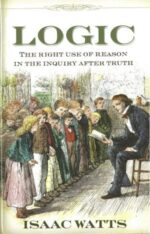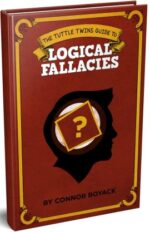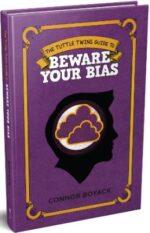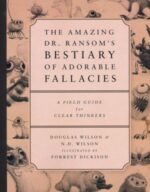Books on Logic
Need we say that sound thinking is a rarity today? Only if we need to assert the obvious. These resources on logic make a valuable contribution to the training of the minds of our readers, whether in a school setting or just for personal learning – by youth or adults.
-
Logic: The Right Use of Reason in the Inquiry After Truth (Isaac Watts)
$23.75As a child of Puritan parents, it is not surprising that Isaac Watts was greatly concerned about people’s ability to think clearly. Whether a man was studying for the ministry or any other of the sciences, the ability to reason rightly was of utmost importance. Watts’s work on logic and reason became a standard textbook for nearly 200 years, being used in such schools as Oxford, Cambridge, Harvard, and Yale.
In Logic, Watts address proper thinking under the four basic functions of the human mind: perception, judgment, reasoning, and disposition. In part one, Watts addresses human perception, the cultivation of ideas, and how we associate them with words. In part two, Watts treats human judgment and its ability to construct various kinds of propositions, while giving guidance for avoiding the formation of bad judgments. Part three covers our ability to reason, giving instruction on the use of syllogisms for constructing a good argument. Part four discusses the mind’s disposition as a method of arranging our thoughts for better understanding and memory.
This book will help discipline the mind and train the reader to discern proper thinking and argumentation in seeking truth.
$28.00 -
The Tuttle Twins Guide to Logical Fallacies (Connor Boyack)
$15.99In a society where countless ideas are being shared, debated, and analyzed, it’s more important than ever to sift out the good ones from among the bad ones. And when people you respect and trust use arguments that sound persuasive, how can you determine if they are correct?
One of the most commonly used methods of spreading misinformation is the use of a logical fallacy—a bad argument that makes something seem truthful that actually might not be. These types of arguments are used repeatedly, and there are many different types.
Fortunately, these logical fallacies can be learned, so they can be avoided. Armed with this information, you’ll be equipped to understand when people are sharing an idea that is wrong or making a claim that isn’t true. You’ll become an expert debater by being able to point out a flaw in an opponent’s argument.
That makes this book dangerous—a guidebook for teenagers and young adults who want to explore the ins and outs of how to win arguments and point out problems in others’ ideas. Use this book wisely!
$19.99 -
The Tuttle Twins Guide to Beware Your Bias (Connor Boyack)
$15.99We all have them. And we know everyone else does, too. But we avoid thinking about them, even though they affect our thinking deeply. What are they?
They are cognitive biases, and they lead our mind to do things that might not be in our best interest. We are all prone to being affected by them, yet hardly anyone takes the time to learn about them—and how to make sure they don’t have as great an impact on us.
That’s where this guidebook comes in, helping teens and adults learn about each bias so that we can make a concerted effort to not fall prey to their powers. Armed with this information, we can think more clearly, better understand ourselves and others, and make good decisions to benefit our lives.
This is powerful information precisely because so few people seek it. Those who read this book will have an advantage over others who are mentally manipulated without knowing it.
$19.99 -
The Amazing Dr. Ransom’s Bestiary of Adorable Fallacies
$22.49Stymied and stumped by arguments that wrap around you like a web of mystification? The Amazing Dr. Ransom’s Bestiary of Adorable Fallacies is here to help!
This Field Guide for Clear Thinkers is filled with illustrations, descriptions, exercises, and analysis to help you identify and avoid fallacies you might encounter in everyday life. Describing fifty informal fallacies organized by context— fallacies of distraction, ambiguity, form, and “millennial fallacies”— each is described as a (adorable yet venomous) creature one might encounter in the wild, complete with illustration and fantastical description.
This book is perfect for supplementing any high school or college logic curriculum . . . or as an independent read for adults who want to learn more about logic! Each fallacy is followed by discussion questions and exercises; a line-listed answer key and both one and two-semester schedules are included in the back of the book.
$24.99







